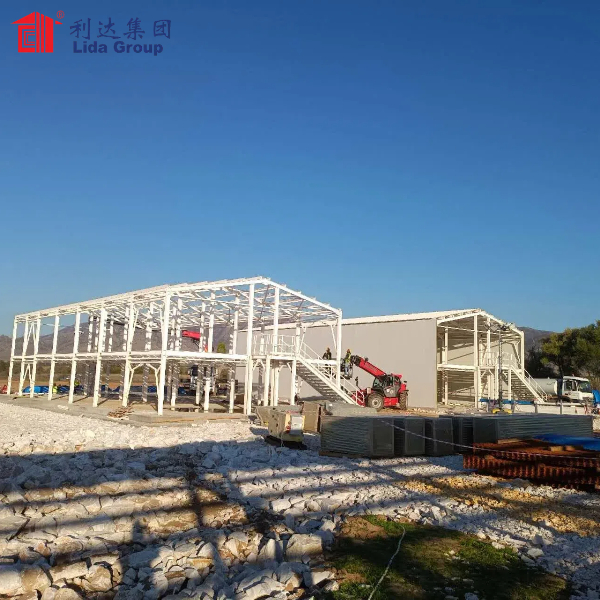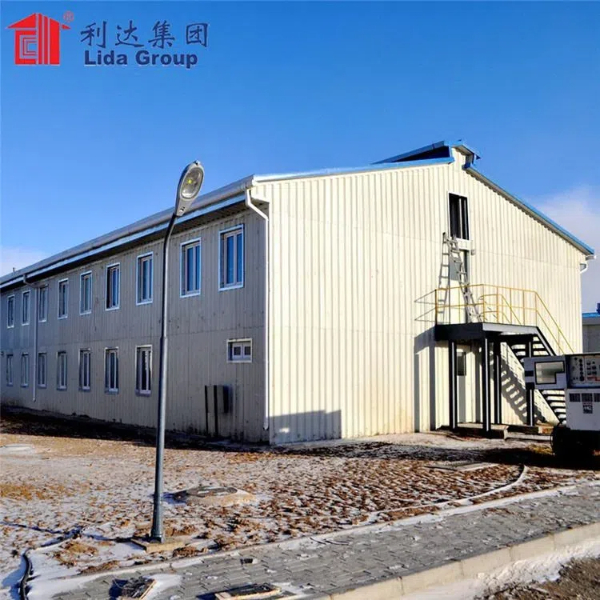Introduction
In today’s dynamic industrial environment, the need for efficient and effective workforce housing solutions has never been greater. As companies expand operations into remote areas, providing suitable living conditions for employees becomes essential not only for operational success but also for worker satisfaction and retention. Lida Group, a leader in prefabricated construction, has emerged as a pioneer in this domain, offering customized prefab houses designed specifically for workforce housing. This article explores Lida Group’s innovative approach to prefab housing, highlighting the importance of customization, the benefits of prefabricated structures, and how these solutions address the unique needs of various industries.
Understanding Workforce Housing
The Concept of Workforce Housing
Workforce housing refers to accommodations provided for employees, particularly those working in remote locations or on temporary assignments. This type of housing plays a critical role in industries such as construction, mining, oil and gas, and renewable energy, where workers often spend extended periods away from home.
Importance of Quality Housing
Quality workforce housing is crucial for several reasons:
- Employee Satisfaction: Comfortable and functional living spaces contribute significantly to worker morale and satisfaction.
- Productivity: Well-designed housing promotes better rest and relaxation, leading to improved productivity on the job.
- Retention Rates: Providing good living conditions can reduce turnover rates, saving companies time and resources in recruitment and training.
Challenges in Traditional Workforce Housing
Traditional approaches to workforce housing often present challenges, including:
- Inadequate Facilities: Many temporary housing solutions lack essential amenities, leading to dissatisfaction among workers.
- Poor Design and Layout: Conventional designs may not consider the specific needs of workers, resulting in cramped and uncomfortable living conditions.
- Limited Flexibility: Standardized housing solutions may not adapt well to the varying needs of different workforces or project timelines.
Lida Group: A Leader in Prefab Construction
Company Overview
Lida Group has established itself as a prominent player in the prefabricated construction industry, specializing in modular housing solutions. With a commitment to quality, sustainability, and innovation, Lida Group aims to provide tailored housing options that meet the diverse needs of various sectors, including workforce housing.
Vision and Mission
Lida Group’s vision is to enhance the quality of life for workers through the provision of high-quality, customized living solutions. The company’s mission is centered on:
- Customization: Delivering tailored solutions that meet the specific requirements of different industries and worker demographics.
- Sustainability: Utilizing environmentally friendly materials and practices in the construction of prefab houses.
- Quality Assurance: Maintaining high standards of construction to ensure durability and comfort.
The Advantages of Prefabricated Housing
1. Speed of Construction
One of the most significant advantages of prefab houses is the speed at which they can be constructed. Key benefits include:
- Reduced Build Time: Prefabricated components are manufactured off-site, allowing for faster assembly on location.
- Minimized Disruption: Quick setup reduces disruption to ongoing operations, ensuring that projects remain on schedule.
2. Cost-Effectiveness
Prefab houses can be more cost-effective than traditional construction methods due to:
- Lower Labor Costs: Factory production requires fewer laborers on-site, reducing overall labor expenses.
- Efficient Material Use: Prefabrication minimizes waste, leading to lower material costs.
3. Design Flexibility
Lida Group’s prefab houses offer extensive customization options, enabling clients to tailor housing solutions to their specific needs. Customization includes:
- Modular Layouts: Configurations can be adjusted to accommodate different workforce sizes and preferences.
- Interior Design Options: Clients can choose finishes, colors, and layouts that reflect their brand or create a welcoming atmosphere.
4. Quality Control
Prefab construction allows for better quality control compared to traditional methods. Benefits include:
- Consistent Standards: Components are manufactured in a controlled environment, ensuring uniformity and adherence to quality standards.
- Durability: High-quality materials and construction techniques enhance the longevity of the structures.
5. Sustainability
Lida Group is committed to sustainable practices in prefab construction. Key aspects include:
- Eco-Friendly Materials: The use of sustainable materials reduces environmental impact.
- Energy Efficiency: Many prefab houses are designed to be energy-efficient, incorporating features such as insulation and solar panels.
Customized Solutions for Workforce Housing
1. Tailored Designs for Different Industries
Lida Group understands that different industries have unique requirements for workforce housing. Customized solutions can be developed for:
- Construction: Housing designed for construction workers may include larger communal spaces and robust furnishings to accommodate active lifestyles.
- Mining: In remote mining operations, durable structures with essential amenities ensure worker safety and comfort.
- Oil and Gas: Housing for oil and gas workers often requires specialized designs that can withstand harsh environmental conditions.
2. Flexibility in Configuration
The modular nature of Lida Group’s prefab houses allows for flexible configurations to meet specific project needs. Options include:
- Single-Unit Housing: For smaller projects or specialized teams, individual units can provide privacy and comfort.
- Multi-Unit Complexes: Larger projects may benefit from multi-unit complexes that foster community while accommodating numerous workers.
3. Comprehensive Amenities
Lida Group’s customized prefab houses can include a wide range of amenities to enhance the living experience for workers. These may include:
- Kitchen Facilities: Fully equipped kitchens allow workers to prepare their meals, promoting healthier eating habits.
- Common Areas: Spaces for dining, recreation, and relaxation foster social interaction and community building.
- Health and Wellness Services: On-site health facilities or wellness programs support physical and mental well-being.
4. Safety Features
Safety is paramount in workforce housing, and Lida Group incorporates various safety features into its designs:
- Fire Safety Systems: Integrated fire safety measures ensure the protection of residents.
- Secure Access: Controlled access points and security measures enhance safety within the housing complex.
Case Studies: Successful Implementation of Lida Group’s Prefab Houses
Case Study 1: Construction Project in a Remote Location
Background
A major construction firm required workforce housing for a large team working on a remote site. The company sought a solution that would provide comfort and community while accommodating over 300 workers.
Implementation
Lida Group designed a customized labor camp featuring:
- Individual Sleeping Units: Each unit provided personal space for workers, ensuring comfort and privacy.
- Common Dining Hall: A large dining area accommodated communal meals and social gatherings.
- Recreational Facilities: Outdoor spaces for sports and relaxation fostered a sense of community.
Results
- Increased Worker Satisfaction: Feedback indicated a significant improvement in worker morale due to the quality of living conditions.
- Enhanced Productivity: The contractor reported improved productivity levels, attributing this to the comfortable and supportive living environment.
Case Study 2: Mining Operation Housing
Background
A mining company operating in a challenging environment required durable and comfortable housing for its workforce. The goal was to create a safe and supportive living space for over 200 workers.
Implementation
Lida Group developed a customized labor camp that included:
- Robust Structures: Designed to withstand harsh weather conditions while ensuring safety and comfort.
- Community Spaces: Common areas encouraged social interaction and teamwork among workers.
- Health and Wellness Facilities: On-site health services promoted overall well-being.
Results
- Improved Retention Rates: The company experienced a decline in turnover rates as workers expressed greater satisfaction with their living conditions.
- Positive Community Atmosphere: The design fostered strong relationships among workers, enhancing teamwork and collaboration.
Economic Benefits of Prefab Workforce Housing
1. Cost Savings for Companies
Investing in customized prefab houses can lead to significant cost savings for companies. Key factors include:
- Lower Construction Costs: The use of prefabricated materials often results in reduced construction expenses compared to traditional building methods.
- Reduced Labor Costs: The efficiency of factory production minimizes labor requirements on-site.
2. Increased Productivity
By enhancing worker welfare, Lida Group’s prefab houses contribute to increased productivity:
- Higher Employee Satisfaction: Comfortable living conditions lead to happier workers, which translates to improved performance.
- Reduced Turnover Rates: Satisfied workers are more likely to stay with the company, reducing recruitment and training costs.
3. Long-Term Investment in Worker Welfare
Investing in customized workforce housing reflects a commitment to worker welfare. Companies that prioritize the living conditions of their workforce often see benefits in employee retention and overall productivity.
The Future of Prefab Workforce Housing
1. Innovations in Design and Technology
As technology continues to evolve, Lida Group is committed to integrating innovative features into their prefab houses:
- Smart Home Technology: Incorporating IoT devices for energy management, security, and convenience.
- Advanced Materials: Utilizing new materials that enhance insulation and sustainability.
2. Expansion into New Markets
Lida Group aims to expand its prefab housing solutions to meet the growing demand worldwide:
- Emerging Markets: Exploring opportunities in regions experiencing rapid industrial growth and workforce mobility.
- Customized Solutions for Diverse Needs: Adapting designs to meet the unique cultural and environmental needs of different regions.
3. Continued Commitment to Sustainability
The future of workforce housing will increasingly focus on sustainability. Lida Group’s dedication to eco-friendly practices ensures that their housing solutions not only meet immediate needs but also contribute to long-term environmental goals.
Conclusion
Lida Group’s customized prefab houses are revolutionizing workforce housing, providing tailored solutions that enhance worker comfort, safety, and community. By prioritizing the diverse needs of various industries, Lida Group is not only addressing the challenges of traditional workforce housing but also setting new standards for quality and sustainability.
As industries continue to expand into remote locations, investing in quality living conditions for workers is essential for fostering a satisfied and productive workforce. Through its commitment to innovation and quality, Lida Group is shaping the future of workforce housing, ensuring that workers have access to the comfortable and supportive environments they deserve.
Contact Us
Post time: Nov-20-2024


